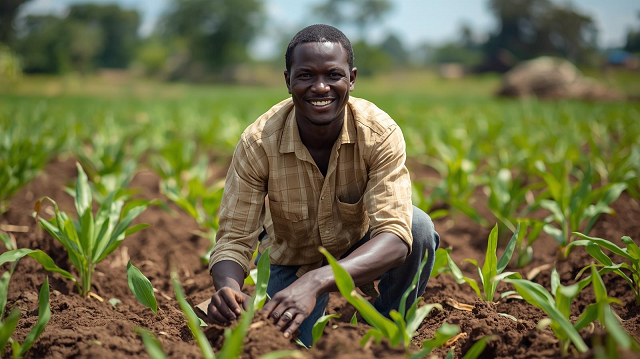Seasonal Agriculture Jobs in Spain for Africans 2026
Overview of Seasonal Agriculture Jobs in Spain for Africans
Seasonal agriculture jobs in Spain have become one of the most reliable entry routes for African workers seeking temporary employment abroad. In 2026, Spain is expected to increase its seasonal agricultural workforce due to rising demands in fruit picking, greenhouse operations, vegetable harvesting, food processing, and farm support roles.
Seasonal employment is temporary but structured. Workers travel to Spain legally, work for a set period—usually between three to nine months—and return home after their contract. For Africans, especially Nigerians, Ghanaians, Kenyans, and other West and East African nationals, this opportunity provides a chance to earn higher wages, gain international work experience, and explore future job pathways.
This article provides a deep, breakdown of everything you need to know about seasonal agricultural jobs in Spain for Africans in 2026. You will learn the requirements, eligibility, visa steps, expected salary, available jobs, mistakes to avoid, testimonies, accommodation, challenges, and realistic opportunities.
Why Spain Needs African Seasonal Agricultural Workers in 2026
Spain’s agriculture sector relies heavily on migrant workers due to several long-standing factors:
An Aging Spanish Population
More Spanish workers are retiring each year, leaving farms understaffed.
Decline in Local Interest in Farm Work
Younger Spaniards prefer urban-based jobs.
Expanding Export Market
Spain exports fruits and vegetables across Europe, increasing demand for labor.
Shortage of Workers from Traditional Sources
Countries like Romania and Bulgaria, which previously supplied many workers, now contribute fewer staff because their economies have improved.
Seasonal Agriculture Jobs in Spain for Africans 2026
Growing Agricultural Regions
Areas like Huelva, Murcia, Valencia, and Almería continue to expand greenhouse and orchard operations.
Africans are becoming a strategic workforce source because of:
-
Strong physical stamina
-
Reliability
-
Availability for seasonal contracts
-
Willingness to work full shifts
-
Increasing bilateral cooperation between African governments and Spain
Types of Seasonal Agriculture Jobs in Spain for Africans 2026
Spain’s agricultural industry is diverse, offering multiple job categories that Africans can apply for.
Fruit Picking Jobs
These are the most popular seasonal roles and include harvesting:
-
Strawberries
-
Blueberries
-
Raspberries
-
Oranges
-
Melons
-
Grapes
-
Peaches
-
Apples
Greenhouse Farming
Workers handle:
-
Planting
-
Watering
-
Sorting
-
Pest control
-
Vegetable harvesting
-
Greenhouse cleaning
Greenhouses operate mainly in Almería and Murcia.
Vegetable Farm Work
Responsibilities include:
-
Picking tomatoes
-
Harvesting peppers
-
Sorting cucumbers
-
Packaging lettuce
-
Transporting produce
Livestock Support Roles
Although limited, some farms hire for:
-
Feeding animals
-
Cleaning barns
-
Assisting with sheep shearing
-
Basic field maintenance
Food Processing and Sorting
Workers handle:
-
Washing fruits
-
Sorting by size
-
Packaging produce
-
Loading crates
General Farm Labor Roles
These include:
-
Irrigation
-
Clearing fields
-
Loading trucks
-
Farm cleanup
These jobs require no experience, making them suitable for unskilled African workers.
Eligibility Requirements for Africans Applying for Seasonal Agriculture Jobs in Spain 2026
The requirements are generally simple because most roles require little or no prior experience.
Basic Eligibility Criteria
Applicants must:
-
Be between 18–45 years
-
Be physically fit
-
Have no criminal record
-
Be willing to work long hours
-
Be available for seasonal contracts
-
Have valid travel documents
Educational Requirements
No formal education is required, but:
-
Ability to read basic English or Spanish
-
Ability to follow instructions
-
Basic communication skills
are beneficial.
Seasonal Agriculture Jobs in Spain for Africans 2026
Medical Fitness Requirements
Applicants should:
-
Have good stamina
-
Be free from infectious diseases
-
Be physically strong enough for farm work
-
Undergo medical screening if required
Document Requirements
Applicants usually need:
-
International passport
-
Police clearance certificate
-
Passport photographs
-
Medical certificate (if required)
-
Employment contract
-
Visa application form
How Seasonal Agriculture Recruitment Works for Africans
Seasonal recruitment typically follows a predictable model.
Step 1: Employer Creates Job Quotas
Spanish farmers submit workforce requests to their regional authorities.
Step 2: Government Allocates Worker Slots
Spain issues quotas for foreign seasonal workers each year.
Step 3: Employers Select Workers
Selection may involve:
-
Job agencies
-
Government migration programs
-
Direct employer selection
-
NGO-led initiatives
Step 4: Contract Issuance
Successful applicants receive:
-
Employment contract
-
Duration of work
-
Salary details
-
Accommodation information
Step 5: Visa Application
Workers apply for a seasonal work visa through the Spanish embassy.
Step 6: Travel Arrangement
Once approved, workers travel in groups to Spain, where employers receive them.
Step 7: Employment in Spain
Work begins immediately with training and deployment to farms.
Step 8: End of Contract and Return
Workers must return home when the contract expires. Returning on time helps ensure future job eligibility.
Spanish Seasonal Agricultural Visa Process for Africans 2026
Spain uses the “Temporary Work Visa for Seasonal Employment.”
Below is the general process.
Step 1: Receive Employment Contract
The employer initiates your visa process.
Step 2: Submit Required Documents
Typical documents include:
-
Valid passport
-
Passport photographs
-
Medical proof
-
Police clearance certificate
-
Signed contract
-
Proof of accommodation by employer
-
National visa form
Seasonal Agriculture Jobs in Spain for Africans 2026
Step 3: Embassy Appointment
Applicants attend biometric and interview sessions.
Step 4: Visa Approval
Processing time varies but usually takes 2–6 weeks.
Step 5: Travel to Spain
Workers travel together on arranged flights.
Expected Salary for Seasonal Agricultural Workers in Spain 2026
Seasonal jobs pay per hour, per day, or per kilogram harvested depending on the farm.
Average Salary Range
-
Hourly Wage: 7–10 euros per hour
-
Daily Wage: 50–70 euros per day
-
Monthly Income: 1200–1800 euros depending on hours
Factors That Affect Salary
-
Location
-
Type of crop
-
Season
-
Productivity
-
Contract type
Additional Benefits
Most employers provide:
-
Free or subsidized accommodation
-
Free work transportation
-
Overtime pay
-
Afternoon meal on some farms
-
Access to healthcare during contract
Which African Countries Qualify Easily in 2026
Countries with strong agricultural partnerships with Spain include:
-
Nigeria
-
Ghana
-
Kenya
-
Morocco
-
Senegal
-
Tunisia
-
Tanzania
-
Uganda
Some nations have bilateral agreements that make approvals easier for their citizens.
Top Spanish Regions Hiring Seasonal Workers in 2026
Seasonal agriculture is concentrated in specific productive regions.
Huelva
Known for:
-
Strawberry farms
-
Blueberry orchards
-
Raspberry fields
Almería
Famous for:
-
Greenhouses
-
Vegetable production
-
Intensive irrigation farming
Murcia
A major hub for:
-
Melons
-
Lettuce
-
Peppers
-
Cabbage
Valencia
Known for:
-
Oranges
-
Mandarins
-
Citrus employment
Lleida (Catalonia)
Popular for:
-
Apples
-
Pears
-
Peaches
Accommodation for Seasonal Workers
Most farms provide accommodation for seasonal workers.
Types of Accommodation
-
Shared rooms
-
Worker hostels
-
Onsite farm housing
-
Community housing blocks
Facilities Included
-
Beds
-
Kitchen areas
-
Bathrooms
-
Laundry stations
-
Electricity and water
Some farms also offer:
-
Free Wi-Fi
-
Transport to work fields
-
Community recreational spaces
Daily Life of Seasonal Workers in Spain
A typical day involves:
-
Waking early (6:00 AM)
-
Morning harvesting
-
Feeding breaks
-
Afternoon sorting or field tasks
-
Evening rest
-
Occasional overtime
Work intensity depends on the season.
Advantages of Seasonal Agriculture Jobs for Africans
These jobs come with several benefits.
High Income Compared to Home Countries
Many African workers can earn in two months what they earn in one year at home.
No Experience Required
Suitable for unskilled workers.
Legal Work Route
A structured, lawful migration pathway.
Opportunity to Build Savings
Income allows workers to:
-
Pay school fees
-
Build houses
-
Start businesses
-
Invest in family welfare
Potential Pathway to Future Employment
Returning workers may receive priority in future seasons.
Challenges Africans Should Expect
Seasonal work is rewarding but demanding.
Long Working Hours
Days may stretch to 10–12 hours.
Physical Strain
Harvesting requires bending, lifting, carrying, and repetitive tasks.
Weather Extremes
Greenhouses get very hot. Outdoor farms get cold in the early morning.
Language Barriers
Spanish basics are helpful.
Limited Day-Offs
Peak season requires consistency.
Seasonal Agriculture Jobs in Spain for Africans 2026
Common Mistakes Applicants Must Avoid
Many applicants fail because of avoidable errors.
Using Fake Recruitment Agents
Only legal channels should be used.
Lying About Age or Documents
Spain performs strict background checks.
Ignoring Fitness Requirements
Unfit workers struggle to meet daily targets.
Waiting for Last-Minute Applications
Seasonal recruitment fills up quickly.
Tips to Increase Your Chances of Being Selected
To stand out:
Stay Fit
Agriculture work requires stamina.
Apply Early
Most employers prefer early applicants.
Learn Basic Spanish Phrases
Simple greetings and instructions are helpful.
Show Willingness to Work Long Hours
Productivity boosts employer confidence.
Maintain a Clean Police Record
It is required.
Testimonies from African Seasonal Workers
Here are realistic examples based on typical worker experiences.
Testimony 1: Nigerian Worker, Huelva
He reported earning enough to build a shop for his wife after one season.
Testimony 2: Kenyan Worker, Murcia
She saved enough money to start a poultry business after two contracts.
Testimony 3: Ghanaian Worker, Valencia
He got invited back for three consecutive seasons due to good performance.
Long-Term Opportunities After Seasonal Work
While seasonal jobs are temporary, they can open doors.
Annual Re-engagement
Productive workers may be invited annually.
Skilled Agriculture Pathways
Some workers advance to:
-
Machinery operation
-
Supervisory roles
-
Greenhouse management
Future EU Job Mobility
Experience in Spain increases chances of future European jobs.
Final Conclusion
Seasonal agricultural jobs in Spain for Africans in 2026 offer a practical, legal, and rewarding employment path for unskilled and semi-skilled workers. With the rising demand for fruit pickers, greenhouse workers, vegetable packers, and general farm laborers, African workers have a strong chance of securing stable income through these short-term opportunities.
However, it is essential to prepare properly, understand the work intensity, follow official recruitment channels, and meet all visa requirements. Workers who follow the correct process often return with significant savings, better skills, and renewed confidence.






